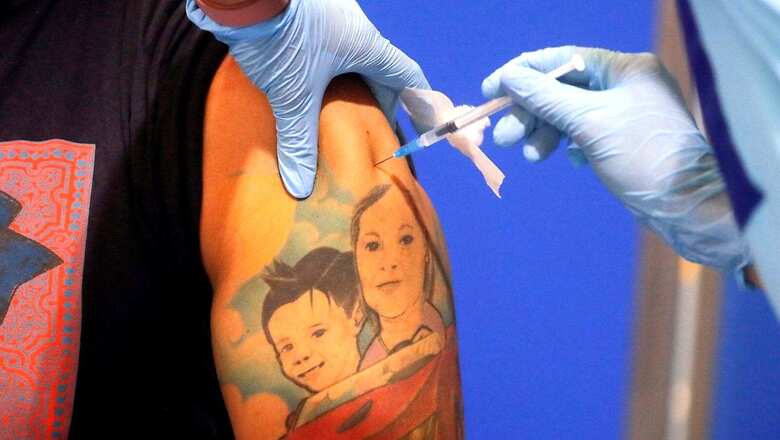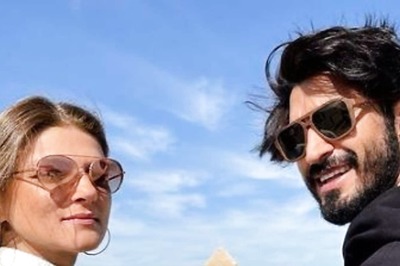
views
Giving people a ‘cocktail’ of Covaxin and Covishield doses provides better immunity than giving two doses of the same vaccine, a study by Pune-based National Institute of Virology (NIV) has now suggested, in what could be the stepping stone for India to start mixing vaccine doses, as many other nations have done earlier, too.
The study, conducted on 18 people by the ICMR-National Institute of Virology, Pune, is yet to be peer-reviewed. The Study compared the safety and immunogenicity profile of the individuals against those who received either Covishield or Covaxin. So what has been the impact so far of ‘mixing’ vaccines, and which countries have implemented the move so far? News18 explains:
‘Mix and Match’ of Vaccines Can Solve Roll-out Problems
Vaccine supply shortage remains a problem in many countries. While a host of developing nations rely on donations from either COVAX or friendly nations, even developed nations such as the UK and France have faced supply let-downs. In such cases, mixing vaccine doses of available stock, can help vaccinate a country’s population faster.
The Countries That Have Allowed Mixing Vaccine Doses
CANADA – Due to Supply Shortages, to Raise Public Confidence
Canada’s public health agency allowed the mixing of Covid-19 vaccines, due to ‘local supply shortages’ or health concerns which might prevent people from getting both their doses. According to reports, the new recommendations came after safety concerns on ‘blood clots’ from the AstraZeneca vaccine, as well as supply issues.
THAILAND – To Raise Immunity of Sinovac
Thailand has allowed the mixing of AstraZeneca COVID-19 vaccine as a second dose for those who received Sinovac’s shot as their first dose in a bid to increase protection. The move was the first publicly announced mix-and-match of a Chinese vaccine and a Western-developed shot, as a new preliminary Thai study raised doubts about the longer-term protection of the two-dose course Sinovacvaccine.
“This is to improve protection against the Delta variant and build a high level of immunity against the disease,” Health Minister Anutin Charnvirakul had told reporters, adding that the second dose of AstraZeneca would come three or four weeks after the first Sinovac shot.
VIETNAM
Vietnam said on July 13 it would offer the mRNA vaccine jointly developed by Pfizer and BioNTech as a second dose option for those who received the AstraZeneca vaccine as their first dose.
ITALY – Amid Health Concerns on AstraZeneca
After the government in Italy prohibited usage of the AstraZeneca vaccine, the Italian Medicines Agency (Aifa) allowed giving people under 60 a combination of Covid-19 vaccinations. Pfizer or Moderna – so-called mRNA vaccines – should be given to everyone under 60 who had already had an AstraZeneca first dosage, according to the health ministry.
BHUTAN – Supply Shortage
Bhutan’s Prime Minister in June said he “has no problem” in mixing-and-matching COVID-19 vaccine doses to immunise a population of about 7,00,000 people in the tiny Himalayan nation, amid vaccine supply shortage. Prime Minister Lotay Tshering — who is also a practicing urologist — said over 90% of the country’s eligible population had received a first dose of AstraZeneca’s vaccine and that the deadline to administer the second dose after a gap of 12 weeks was scheduled to end this month.
FINLAND
On April 14, Finland’s Institute of Health and Welfare announced that anyone under the age of 65 who had the first dosage of AstraZeneca’s vaccine may receive an alternative shot for their second dose.
FRANCE
In April, France’s top health advisory council suggested that persons under 55 who were first given AstraZeneca be given a second dose of a so-called messenger RNA vaccination, despite the fact that dose-mixing has not yet been tested in trials.
NORWAY
Norway said on April 23 that patients who have received one dosage of the AstraZeneca vaccine will receive a second dose of an mRNA vaccine.
SPAIN
On May 19, Spanish Health Minister Carolina Darias said that people under 60 who received an AstraZeneca vaccine first would be eligible for a second dosage of either AstraZeneca or Pfizer’s vaccine. The decision was based on preliminary findings from the Carlos III Health Institute, which revealed that supplementing an AstraZeneca vaccine with a Pfizer shot was both safe and effective.
SWEDEN
On April 20, Sweden’s health agency said that persons under the age of 65 who had already received one dosage of AstraZeneca’s vaccination will be given a different vaccine for their second dose.
UK
In January, the United Kingdom announced that in exceptionally unusual circumstances, such as when the initial vaccine is out of stock, people will be offered a different vaccine for a second dosage.
According to the preliminary findings of an Oxford University-led study published on May 12, people who received Pfizer’s vaccine followed by an AstraZeneca dose, or vice versa, were more likely to report mild or moderate common post-vaccination symptoms than those who received two doses of the same type.
Novavax said on May 21 that it would participate in a COVID-19 vaccine mix-and-match trial to see if an additional vaccination dosage from a different manufacturer might be used as a booster. The trial began in June in the UK.
USA
According to CNBC, the US Centers for Disease Control and Prevention (CDC) amended its guidelines in January, permitting a mix of Pfizer/BioNTech and Moderna vaccines with a 28-day interval between them and in “exceptional situations.”
Studies That Support the Move
Denmark Study: Combining AstraZeneca With Moderna Gives ‘Good Protection’
Combining AstraZeneca’sCOVID-19 vaccine with a second dose from either Pfizer-BioNTech or Moderna’s jab provides “good protection”, Denmark’s State Serum Institute said recently. More than 144,000 Danes, mostly frontline personnel in the health sector and the elderly, received their first injection with the AstraZeneca vaccine and were later vaccinated using Pfizer or Moderna vaccine for a second dose. “Studies show that fourteen days after the combined vaccination program, the risk of SARS-CoV-2 infection is reduced by 88 percent compared to unvaccinated individuals,” said Denmark’s State Serum Institute (SSI).
Russia: Mixing Sputnik V and AstraZeneca Shot Has No Serious Side Effects
Russia’s Direct Investment Fund (RDIF) had said on July 30 that trials mixing a first dose of the Sputnik V vaccine with AstraZeneca’s shot revealed no serious side effects and no subsequent coronavirus cases among volunteers.
It added that the full results of the trial, which was approved on July 26 after being suspended in May by the health ministry’s ethical committee because of a lack of data, would be published this month.
South Korea: Six Times Better Immunity
A study from South Korea found in July that a mixed vaccination of an AstraZeneca shot first and then a Pfizer one boosted neutralizing antibody levels six times more than two AstraZeneca doses.
UK: Best T-Cell Responses
In June, a British study showed that an AstraZeneca shot followed by a Pfizer one produced the best T-cell responses, and a higher antibody response than a Pfizer shot followed by an AstraZeneca one.
With inputs from Reuters
Read all the Latest News, Breaking News and Coronavirus News here.




















Comments
0 comment